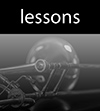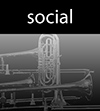Time and time again I see hard work destroy the more talented competition. Give it time and every time a consistency of mindful practice will beat those with the good sense to be born with more talent than you. I think that’s what drew me to the music when I was younger - I love that with discipline, I have more say in my fate. I won’t lie, luck always has a role to play, but with the right practice culture, we students of music can use our grit to get through the hardest times and come out even luckier than we might normally be on the other side.
DISCIPLINE STARTS WITH YOUR PURPOSE
"Begin with the end in mind”
The Seven Habits of Highly Effective People - Stephen Covey
When you define your purpose, it is easier to know HOW to get where you want to be in this world. Where do you want to be in 10 years? Nine times out of ten, when I ask students this question, I get a stammering, evasive answer something like, “ummm….playing in an orchestra and teaching on the side….?” Even this response takes quite an emotional toll on the student and I always feel bad for making them feel bad. The often noncommittal answer to the question can indicate how useless each practice session may be for the student. The truth is, 1 hour of purposeful practice is far more transformative than 4 hours of practice with no direction.
But what about you, the reader, what is your goal? Because I believe in this concept so much, I suggest you do an exercise. Let’s say you want to be the Second Trombone of the Philharmonic. Not an easy thing to say out loud because there is likely a lot of judgment from yourself and probably your peers, your family, and your teachers (more on that later). Do yourself a favor today and write down what you really want. Sit with your dreams for a moment and just let the truth of what you want sink in - a reason for your hours upon days upon years of work with the trombone. There must be a reason for all of the sweat, long tones, lip slurs, Arbans, emotional pain with real tears, recitals, and excerpts by the hour, right?
Both success and failure can be nerve wracking.
Now, let’s say today is the day you won that job of your dreams. Seriously, let the feeling of that win wash over you as a reality. Today is the day you affirmed all your hard work. You must absorb this new position as a huge part of who you are in this world. Today is the day that your whole life changed.
Knowing that today you won YOUR job with the Philharmonic, write down what you “were doing” to make this win a reality “yesterday”. I mean it - write down what you did the day before you won your new job that made the biggest difference for “today”! Do not read this as if it’s meant for someone else OR that you will do it later - DO THE EXERCISE, NOW!!
What did you do to finally realize your dreams "a week ago." Write down what made the biggest difference one week before you won your job as 2nd trombone with the Philharmonic as if you are preparing to teach a master class to young eager musicians on how you did what you did. Eager students will want to know how to get where you are and you owe them a cogent answer. Build a few bullet points to teach them your winning strategy, e.g., what did you eat, how did you practice, what did you listen to, what worked and what you think might not have worked so well.
Visualize your master class. Teach people how you achieved your goals.
Now, do the exercise for "a month ago….." Who all did you study with? How did you interact with your friends and family for your preparation? How did you exercise? What did you eat? What did you listen to? What and even Whom did you avoid to keep your body and your mind right (strategizing better boundaries with nay sayers is challenging, right?)? When did you buy your plane tickets etc.?
How about “3 months before your big day” and then, what made this win such a real possibility “a year prior”?
This strategizing exercise is a method I picked up in the book, “Peak Performance” by Garfield and believe you me, it really works. The technique of clustered brainstorming garners a better organized conflation of your ideas that will start to make the path to what you want much more clear than it was during your comparatively directionless practice sessions.
Here’s a quick question, did this brainstorming exercise stress you out enough to skip it entirely? You’re not alone. In fact, most people react this way. Look, I’m no therapist but I’ll tell you a secret; winning a job is a lot more stressful than losing - I’m serious! Losing an audition means your life stays the way it is, you keep your significant other without distance drama, you don’t need to leave your friends, and obviously you don’t have to move. Winning means your life will change dramatically, and there is a real emotional toll that goes with your big success. Preparing for these big events can be like an enormous lunch sandwich that is way too big for one sitting. When you try to emotionally process the event too quickly, it can be like trying to fit the whole sandwich in your mouth all at once. Just looking at the enormous meal, it’s clear you’ll likely choke under the pressure of planning it out, let alone stay motivated enough to see the project through every bite to the end.
One bite at a time. “Inch by inch, life’s a cinch. Yard by yard, life is hard.”
My advice? Try putting the meal of that big experience in your mouth one small bite at a time and chew slowly. Trust me, this is a life skill applicable to a variety of circumstances. Any time I get stressed, I know I’m trying to think about way too much at once. This is an easy analogy to get me past a frightening experience.
Moreover, it leaves room for life to evolve authentically. As life unfolds it becomes clear your plans will not be exactly as you imagined them and that’s okay. The one bite/ one day at a time analogy works because along with small consistent wins, it leaves room for you to deftly navigate the inevitable failures you’ll meet on the way to your goals as you adjust your course with a clear purpose. Thinking about too much all at once usually results in small anxiety-ridden setbacks that seem to define our reasons to give up.
You can see that with a little bit of effort, you can walk backwards from the win of your dreams, day by day, all the way back to the present and you will have a much clearer picture of how to get what you want. Your purposeful practice becomes qualitative because your reasons for every moment of your practice time is better defined. You can say, "I’m playing long tones several times a day because I want my Mahler 3 excerpt to be more stable with a world class sound. I’m practicing my Bordogni Etudes because that way I will be a more convincing phrase architect….” All of this gives you a purposeful mindset and sounds much more intelligent than, “I’m practicing long tones and Bordogni Etudes because my teacher said so and I don’t want to make them angry.” You can see past the short term approval, the grade, or even the audition. All of these things become a tool to get you to your ultimate goal that you had the courage to define.
You know you need to practice but now you have a firm grasp of why you will practice so much. And the most empowering thing is you chose it. When you know your purpose, adversity is easier to handle. You stop sabotaging yourself with divided focus. You stop taking things so personally. Your teacher offers feedback and you are grateful to find a shortcut or a detail you’d missed instead of waisting time nursing your fragile pride. You gain patience and compassion for yourself and your colleagues. At an audition, a concert, or in your life, unexpected things are going to go wrong and when they do, they can define your perception of who you are if you don’t have a clear sense of purpose.
Have you ever moved? Of course you have! Imagine that you are carrying a heavy, fragile and very valuable load up 2 flights of stairs. 7 steps from the top, you stub your toe but catch yourself just before you drop everything. In this moment you have a perfect excuse to embrace disaster - drop and destroy your heavy burden to better focus on the pain of your toe - everyone would understand. But because of your sense of PURPOSE, e.g. get the heavy box of fragile things to the top of the stairs safely, you right yourself and soldier upward to bring the burden to the top along with the pain in your toe.
With purposeful practice, every day is a battle to focus the mind a little better. Each day you will find that the way forward changes a little at a time. Even though you know what you’re working toward, the anxiety and pressure of that goal is always there. But when you know where you’re going, it’s easier to find courage to play well when you’re afraid. When you practice with this sense of purpose, you are building an ability to focus on doing a hard thing under intense pressure, even though you know you’re not perfect. In these moments, it will be either your fear or your direction that will define you. When you have a clearly defined sense of purpose, the way forward is obvious.













